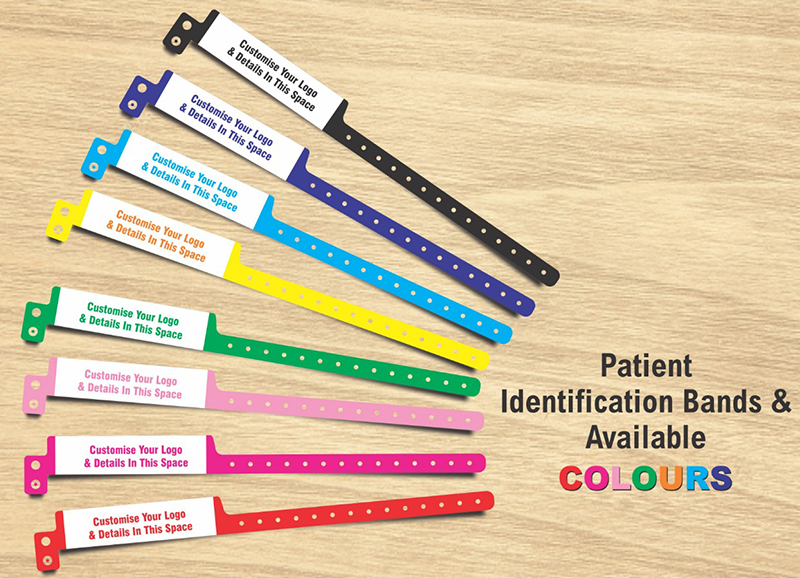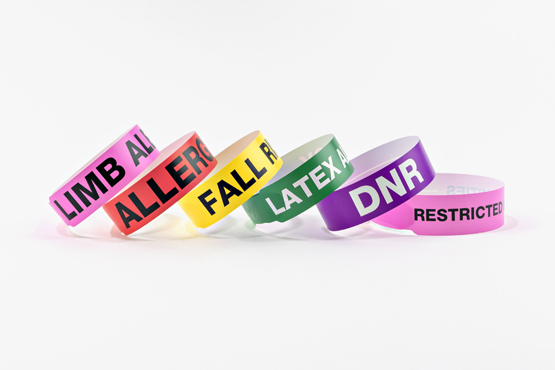How a Patient Identification Band Can Help Prevent Patient Misidentification in Healthcare Settings
Wiki Article
Discovering the Different Kinds Of Patient Identification Band Used in Clinical Facilities
In the complex world of health care, the essential function of Patient Identification bands frequently goes unnoticed. These bands, differing from basic paper wristbands to advanced RFID bands, develop the foundation of Patient safety and security protocols, making sure precision in Patient Identification.Comprehending the Importance of Patient Identification Bands
While they might appear like simple accessories, Patient Identification bands play an essential duty in clinical facilities. These bands serve as a crucial tool for confirming Patient identification, stopping clinical mistakes associated to misidentification. Patient Identification bands additionally help in enhancing administrative jobs, making sure precise record-keeping and billing.Traditional Paper Wristbands: Their Use and Limitations
Typical paper wristbands have actually been a staple in Patient Identification throughout different clinical facilities. While their use prevails, they nurture certain constraints that may affect their performance in Patient management. This area will concentrate on the extent of their application and the fundamental drawbacks linked with their usage.
Paper Wristbands: Usage Extent
In the realm of Patient Identification, paper wristbands have long held a crucial duty. These bands are usually used in outpatient setups, where the Patient's keep is short-term. The wristbands have necessary info such as the Patient's name, date of birth, and an unique Identification number. This simple, yet efficient system, permits doctor to rapidly and properly identify people, guaranteeing the proper treatment is carried out. Paper wristbands are additionally utilized in emergency situation situations, where quick Identification is critical. Their usage extends to occasions like blood donation drives and mass inoculation programs, further highlighting their versatility. In spite of innovations in technology, the simple paper wristband continues to be a affordable and trusted solution for Patient Identification in different health care scenarios.Limitations of Paper Wristbands
Regardless of their extensive usage, paper wristbands are not without their disadvantages. In addition, paper wristbands usually lack the technical abilities of even more contemporary alternatives, such as barcoding or RFID chips, restricting their functionality to just displaying created information. Paper wristbands can create discomfort or skin irritability to some clients, specifically when worn for extensive periods.Barcoded Wristbands: Improvements in Patient Identification
While Patient Identification has long been a critical facet of health care, the arrival of barcoded wristbands represents a substantial leap ahead. These bands utilize the simplicity of barcoding modern technology, enabling Patient details to be quickly scanned and accessed. They boost the rate and precision of Patient Identification, minimizing the threat of medical errors connected to misidentification. Barcoded wristbands are cost-effective, very easy to produce, and get rid of handwriting mistakes usual with manual systems. Nevertheless, they are not without constraints. While they offer improvements over conventional bands, the barcode can come to be smudged or used, rendering it unreadable. Despite this, barcoded wristbands stay a necessary device in contemporary health care settings, representing the junction of modern technology and Patient treatment.Radio Frequency Identification (RFID) Bands: an Action In The Direction Of Futuristic Medical Care
The advancement of Patient Identification bands has caused the emergence of Superhigh frequency Identification (RFID) Bands (patient identification band). These innovative tools existing crucial advantages for healthcare centers, supplying a much more efficient and technically advanced means of Patient Identification. The implementation of RFID in medical care is a substantial action in the direction of a much more futuristic approach to Patient administration and safetyRecognizing RFID Bands

RFID Bands: Trick Advantages
Mainly, these bands enhance Patient safety by supplying exact, instant Identification, therefore reducing medical errors. RFID bands can save a substantial amount of Patient information, including medical history and allergic click reactions, making it possible for personalized care. In general, RFID bands represent a considerable innovation in Patient Identification modern technology, profiting both patients and healthcare suppliers.
Applying RFID in Medical Care
These bands give a seamless way to track and identify people, ensuring their safety and security and enhancing performance in treatment procedures. RFID bands lower medical mistakes by offering exact Patient Identification, which is important in preventing misdiagnosis or wrong medicine administration. Hence, the implementation of RFID bands is a read this post here substantial step towards boosting Patient security and healthcare shipment.
Color-Coded Wristbands: Helping in Quick and Accurate Diagnosis
In the busy setting of a medical facility, color-coded wristbands have actually arised as important devices for swift and precise Identification of a person's medical condition. These wristbands, used by patients, carry certain colors that match to different medical conditions or standings. This system is designed to provide instant aesthetic signs to healthcare suppliers, boosting Patient safety and security and care high quality.Strategies for Effective Application and Administration of Patient ID Bands
Accomplishing optimum use of Patient Identification bands demands a well-structured approach for their execution and administration. Patient education and learning is additionally critical; individuals should recognize the function of the bands and the need for their continuous wear. It's important to have a back-up plan in area, such as barcode scanning or biometrics, to make sure that Patient Identification is never ever jeopardized.
Conclusion
Patient Identification bands are critical in medical facilities to make certain safety and accuracy. Efficient application and monitoring of these bands can significantly decrease medical mistakes, enhance performance, and improve total Patient treatment.These bands, differing from simple paper wristbands to advanced RFID bands, develop the backbone of Patient security procedures, making certain precision in Patient Identification.The development of Patient Identification bands has brought regarding the introduction of Radio Regularity Identification (RFID) Bands. Generally, RFID bands stand for a substantial innovation in Patient Identification innovation, profiting both individuals and health care carriers.
RFID bands lower clinical mistakes by supplying precise Patient Identification, which is crucial in protecting against misdiagnosis or incorrect medicine management. Patient education is also crucial; people have to recognize the function of the bands and Get More Info the requirement for their continuous wear.
Report this wiki page